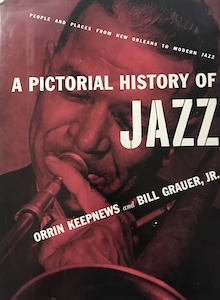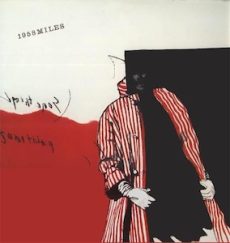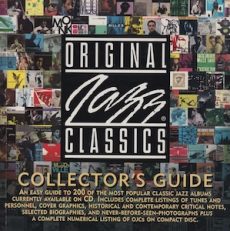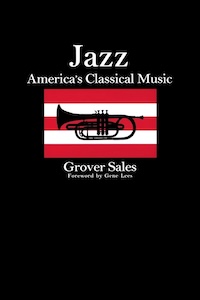
On The Bookshelf
A Pictorial History Of Jazz | Orrin Keepnews & Bill Grauer Jr.
A classic photographic collection documenting jazz history, particularly up to the mid-1960s, though some note its coverage of later styles is limited. Praised for its extensive and captivating black-and-white photographs, the text may be less substantial than the images and the coverage of later jazz movements is not as thorough.
The book is often described as a valuable visual reference for jazz enthusiasts, and some consider it an essential purchase, though older editions may be harder to find in good condition.
A Pictorial History Of Jazz: 1966 Crown Publishers, Inc.

Requisites
1958 Miles ~ Miles Davis | By Eddie Carter
Throughout his career, Miles Davis was widely regarded not only as a leading figure in jazz but as a monumental presence in music as a whole. He consistently demonstrated his influence by producing an impressive array of records that have remained influential over the years, offering critics, listeners, and fellow musicians more to consider and appreciate than most artists across any musical style. This morning’s album up for discussion is 1958 Miles (CBS/Sony 20AP 1401). Interestingly, this record did not see a complete release in Japan until 1974. Tracks: A1 to A3 were initially released on “Jazz Track” in 1958. Track B1 later appeared on the 1975 double album “Black Giants, ”while track B2 appeared twice in 1973, on the compilations “Basic Miles—The Classic Performances of Miles Davis” and the CBS/Sony Japanese release “The Miles Davis Quintet & Sextet.”
By the time he recorded this album, Davis had brought in some new talented musicians to his group. Red Garland and “Philly” Joe Jones had left, and in their places, pianist Bill Evans and drummer Jimmy Cobb joined the band. Rounding out the ensemble are Julian “Cannonball” Adderley on alto sax (tracks: A1, A2, B1), John Coltrane on tenor saxophone (tracks: A1 to B2), Bill Evans (tracks: A1 to A3, B1), and Red Garland on piano (track: B2). On bass, Paul Chambers is featured on track B2, while Jimmy Cobb (tracks: A1 to A3, B1) and “Philly” Joe Jones (track: B2) keep the rhythm going on drums. The copy of the album I used for this report is the 1979 Japanese Mono Reissue.
Side One kicks off with the timeless song On Green Dolphin Street by Bronislaw Kaper and Ned Washington.Initially written for the 1947 film “Green Dolphin Street”, it’s Miles Davis’s version that truly made it a jazz standard we cherish today. He starts his soulful dialogue on the muted horn, with the trio providing a relaxed, friendly groove around the melody. His energetic lead solo radiates positive vibes, sizzling at a comfortable medium heat, while Coltrane responds with a lively, lyrical interpretation. Cannonball adds his beautiful touch on the third reading, and Evans plays just as wonderfully, culminating in a joyful moment before Miles wraps up the song with a satisfying finish.
Fran-Dance is a heartfelt tribute from Miles to his second wife, Frances Taylor. I first heard this beautiful tune on the 1961 live album, “Miles Davis In Person, Saturday Night at The Blackhawk, San Francisco, Volume 2.” Miles, playing a gently muted trumpet, creates a beautifully dreamy theme that feels warm and inviting, ending with a rich, mellow note. Coltrane’s opening is so lush that it feels like it melts right into your heart. Cannonball's tender, slightly fragile tone adds a delicate touch to the next performance, and Evans approaches the finale with such fingertip delicacy that it becomes one of his most touching ballad performances.
The 1944 jazz classic Stella By Starlight, by Victor Young with lyrics by Ned Washington, provides a graceful ending to the album’s first side and stands as a cherished staple of The Great American Songbook. Cannonball takes a reflective moment to appreciate this enduring masterpiece, highlighting the remarkable solos by Miles, Coltrane, and Evans. The enchanting atmosphere is set immediately with the opening chorus, as the muted trumpet conveys each phrase with deep emotion. Coltrane delivers a powerful, regal rendition, seamlessly leading into Evans’ exquisite solo, which builds to a memorable climax.
Love For Sale, by Cole Porter, made its first appearance in the 1930 musical “The New Yorkers.” The song’s lyrics paint a vivid image of a streetwise woman offering love for purchase, and it has become one of Porter’s most frequently covered songs. Notably, Cannonball and Miles recorded their own rendition just two months earlier for the 1958 album “Somethin’ Else.” Miles opens with a brisk, upbeat introduction, playing with a mute and delivering a truly memorable highlight. Following that, Cannonball takes over and shines brilliantly. Evans then immerses himself in the closing statement, providing a remarkable performance before the group’s theme reprise concludes.
Jackie McLean’s composition Little Melonae made its debut on his 1955 album, “Presenting Jackie McLean”, and is dedicated to his daughter. Cannonball Adderley also doesn’t perform on this track. The quintet introduces the tune with a unified statement of the melody, followed by a captivating solo from Miles Davis, who opens with the mute off, adding a striking touch. John Coltrane responds with heartfelt sincerity in the following statement. Red Garland impresses with refined technique and elegance on his only appearance on the album. Paul Chambers briefly steps into the spotlight, after which the quintet brings the song to a close together.
Teo Macero produced the album, and Larry Keyes carefully engineered each recording session. The sound quality is absolutely stunning across all ranges—treble, midrange, and bass—creating a rich, immersive experience. The sextet’s performance surrounds your favorite listening spot with a beautifully solid soundstage from the instruments, making every note feel alive. Since this is a Japanese release, 1958 Miles might be a bit tricky to track down on your next vinyl hunt. But with a little patience, you’ll be rewarded with an extraordinary album that would make an excellent addition to the Hard-Bop section of your library. It also offers a fresh perspective on Miles Davis’s sound in the Modal style, which reached its peak a year later with “Kind of Blue!”
~ Basic Miles-The Classic Performances of Miles Davis (Columbia KC 32025); Black Giants (Columbia KG 33402); Jazz Track (Columbia CL 1268); Kind of Blue (Columbia CL 1355/CS 8163); Miles Davis In Person, Saturday Night at The Blackhawk, San Francisco, Volume 2 (Columbia CL 1670/CS 8470); Presenting Jackie McLean (AdLib 6601); Somethin’ Else (Blue Note BLP 1595/BST 81595); The Miles Davis Quintet & Sextet (CBS/Sony SOPM-140) – Source: Discogs.com
~ On Green Dolphin Street, Love For Sale – Source: JazzStandards.com
© 2025 by Edward Thomas Carter
More Posts: choice,classic,collectible,collector,history,instrumental,jazz,music,trumpet

On The Bookshelf
Original Jazz Classics Collector’s Guide
An easy guide to 200 of the most popular classic jazz albums currently available on CD. Includes complete listings of tunes and personnel, cover graphics, historical and contemporary critical notes, selected biographies, and never-before-seen-photographs plus a complete numerical listing of OJCs on compact disc.
Original Jazz Classics Collector’s Guide: 1995
Fantasy Inc.

Requisites
Over the past fifty years, I’ve found immense joy in listening to Ahmad Jamal’s work across his extensive catalog, including releases on Argo, Cadet, and later Impulse Records. Each time I was fortunate enough to experience his trio live in Atlanta, their performance was absolutely electrifying. Jamal and his group consistently delivered music that was both profoundly moving and impeccably polished. Today’s featured album from my collection is Freeflight (Impulse! – ABC Records AS-9217), which showcases the trio’s live set at the Montreux Jazz Festival. On this recording, Ahmad Jamal plays both the Fender Rhodes electric piano and acoustic piano, joined by Jamil Nasser on bass and Frank Gant on drums. My personal copy is the 1973 U.S. stereo reissue, which retains the original catalog number.
The set opens with a warm welcome to the musicians, setting the stage for the trio’s spirited rendition of Effendi, by McCoy Tyner. The trio dives straight into the brisk tempo, with Ahmad igniting an energetic solo on the electric piano. There’s a brief exchange between Jamil’s bass and Ahmad’s acoustic piano before Jamal returns to the electric keys. Frank contributes a concise, lively reading, and Jamil finishes with an exhilarating finale, driving the tune to a thrilling close, earning an enthusiastic response from the audience. The tempo eases as Jamal introduces Dolphin Dance by Herbie Hancock on the acoustic piano, segueing into the group's melody. Jamal’s deeply expressive playing doesn’t disappoint, leading to a vibrant conclusion and audience applause.
Side Two begins with Ahmad and Jamil engaging in a musical conversation, leading into the pianist’s Manhattan Reflections. Jamal returns to the electric piano for a buoyant mid-tempo melody, then takes off first with a spirited opening statement that captures the energy of both instruments. The piano and bass then share the spotlight briefly to revisit the theme before the trio’s closing chorus ends gently. Ahmad returns to the acoustic piano to conclude the set with his signature tune, Poinciana by Nat Simon and Buddy Bernier. A solo introduction from Jamal leads into the ensemble’s mid-tempo theme. As the only soloist, Jamal tells a captivating story with Nasser and Gang’s support until the trio reunites to conclude the song, greeted by the audience’s enthusiastic applause!
The production of Freeflight was a collaborative effort between Ahmad Jamal and Ed Michel, while Carlos Olms and Stephan Sulke handled the recording of the live performance. Overall, the recording quality is commendable, though there’s one significant flaw: the microphone was positioned too close to Jamal’s electric piano during Effendi, resulting in noticeable harshness and overmodulation. However, please don’t let that minor drawback deter you from seeking out Freeflight by Ahmad Jamal when browsing for records on your next shopping trip. Although not as well- known as his earlier live release, At The Top: Poinciana Revisited, this album still deserves consideration for your library. Even after more than five decades, the album delivers outstanding piano trio music and is highly Recommended!
~ At The Top: Poinciana Revisited (Impulse! – ABC Records AS-9176) – Source: Discogs.com
~ Poinciana – Source: Wikipedia.org
© 2025 by Edward Thomas Carter
More Posts: choice,classic,collectible,collector,history,instrumental,jazz,music,piano

On The Bookshelf
Jazz: America’s Classical Music | Grover Sales
Jazz critic Grover Sales takes the reader on a journey of introduction to the history, complexity and criticism of the music in Jazz: America’s Classical Music. This book illustrated with photographs, is considered a classic text and an ideal guide for both beginners and those familiar with the genre.
In an engaging and conversational style, the renowned jazz teacher tells of the lives and music of the greats like Ellington, Tatum, Hawkins, Coltrane, Parker, Hines, Goodman, Armstrong, and many others. He does this with a mix of important facts, fascinating anecdotes, and brilliant interpretations.
The author was a prominent figure in the jazz world, he taught at Stanford University and worked as the publicity director for the Monterey Jazz Festival.
Jazz: 1984 | Grover Sales
Prentiss-Hall Press



